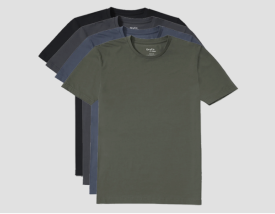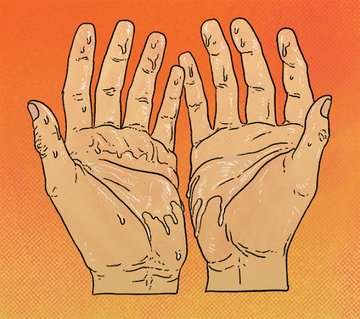It doesn’t matter how cool, calm, and collected you may feel, an episode of excessive sweating can strike at any time if you’re a hyperhidrosis sufferer. That’s what makes it so frustrating - pinpointing the triggers seems impossible!
Although the exact causes of primary hyperhidrosis are mostly unknown, researchers have found a brain chemical that likely plays a major role in the condition - acetylcholine. This neurotransmitter powers many bodily functions and is vital for your wellbeing. It’s also the “suspect” behind excessive sweating.
This post will take a look at acetylcholine’s role in hyperhidrosis and how you may counteract its effects.
Acetylcholine - A Necessity & A Nuisance
Acetylcholine was the first neurotransmitter ever identified. It triggers muscle movements by stimulating the synapses where your nervous system connects to your muscles (neuromuscular junctions).
Think of acetylcholine as keys to the ignition in a car. Inserting, then turning the key ignites your car’s engine cycle, allowing you to drive when you’re ready. Acetylcholine has a similar effect on numerous bodily processes, and ultimately, it allows you to move freely and think clearly.
Key Functions of Acetylcholine
- Facilitate learning and memory
- Control the sleep-wake cycle
- Reduce inflammation
- Protect against infections
- Support healthy gut movement
- Increase alertness and attention span
- Minimize pain perception
- Improve blood flow
- Balance hormonal production
A deficiency of acetylcholine is problematic and can lead to certain conditions and symptoms. But too much acetylcholine is also a bad thing. An overabundance of this neurotransmitter makes your body go haywire. When it happens, you may experience:
- Depression
- Brain fog/difficulty thinking
- Hives
- Nausea and vomiting
- Diarrhea
- Liver damage
- Fishy body odor
- Excessive sweating
Let’s focus on that last point - excessive sweating. Researchers are now well-acquainted with the fact that acetylcholine can trigger heavy sweat production.
Acetylcholine as a Cause for Excessive Sweating
Your eccrine sweat glands (the non-stinky ones), located on your palms, soles, armpits, and face, are densely connected with nerve fibers that are heavily stimulated by acetylcholine. These bodily regions happen to be areas where hyperhidrosis sufferers sweat the most.
If you suffer from excessive sweating, there’s a good chance you have an abundance of nerve fibers that are triggered by the release of acetylcholine. Or, the nerve fibers in your affected bodily regions might just be more sensitive to the production and release of acetylcholine.
What remains unclear is what triggers these nerves to fire so radically. There might be some mechanisms that make these nerve fibers overreact. Emotional or physical stress may play a part but that has not been confirmed yet.
However, there are some triggers that have consistently been identified as stimulating acetylcholine production both scientifically and anecdotally.
Acquainting Yourself With Acetylcholine Triggers
- Caffeine - Hot or cold caffeinated beverages activate acetylcholine production and increase sweating.
- Alcohol - A drink or two won’t hurt, but anyone who’s had a rough night will know that alcohol makes you sweaty. It influences the release of acetylcholine, making it vital for hyperhidrosis sufferers to limit their alcohol intake.
- Nicotine - Smoking a cigarette or chewing tobacco is known to trigger sweating, even in non-hyperhidrosis individuals since the drug activates acetylcholine receptors. Here’s another good reason to quit!
- Artificial sweeteners - Studies are showing more evidence that aspartame and other artificial sweeteners are neurotoxic and disrupt neurotransmitter production. Acetylcholine seems to be affected, so it’s wise to avoid these sweeteners.
- Prescription & recreational drugs - Both prescription and recreational drugs can have effects on the acetylcholine system. Speak with your doctor about the medications you’re taking since adjusting the dosage may reduce your sweating. Also, make an effort to quit the use of recreational drugs not just for excessive sweating, but for your overall health.
- Choline-rich diet - Choline is a vital nutrient and it is important to get it from your diet. However, eating a surplus of choline-rich foods can make sweating worse. Remember, balance is key.
Anything that affects the production of acetylcholine can be a trigger. Some are completely avoidable while others are not so easy to avoid. In the case of certain foods or medications, you might still need to consume them but at a lower dose or serving.
Non-Medicinal Treatments for Excessive Sweating
There are two other things to keep in mind when thinking about acetylcholine's role in hyperhidrosis. First, you can't completely rewire your nervous system. If you have a higher number of nerve innervations triggered by the acetylcholine, you will be more prone to hyperhidrosis than others. Second, though, you can still keep your levels balanced and dress for comfort when the occasion calls for it.
Make Lifestyle Changes
You can balance your acetylcholine levels by making lifestyle changes. Much of it is about practicing avoidance: reducing your intake of foods, drinks, or medications that may trigger your body to go into acetylcholine overload.
You have to practice a degree of mindfulness to figure out what your individual triggers may be. You don’t have to be a yogi or zen master to do this though. After being exposed to a suspected trigger, monitor yourself to see how much you sweat. Then avoid this “offender” for a while. If there's a clear difference, then you've likely found a trigger and should avoid it for good!
Wear Sweat Resistant Fabrics
Sweat-resistant fabrics don't have any effect on acetylcholine, but they can keep you dry and comfortable. It may take a while before you identify your hyperhidrosis triggers, so in the meantime, you need a practical anti-sweat solution. Wearing sweatproof shirts and other forms of sweat-resistant clothing can help.
They contain moisture-wicking materials and mesh patterns that will help you feel dry faster, prevent stains and reduce stickiness. Just feeling and looking less sweaty is a relief in itself. But with such relief, comes peace of mind until you get a better handle on what’s making you sweat so much.
Neat Apparel sweat-resistant fabrics can help you stay dry and ward off the stains and stickiness. You can wear our sweatproof undershirts in casual or professional settings where focus and confidence matters most.
Excessive Sweating - It All Boils Down to Chemistry
Next time you're feeling bummed out or frustrated by hyperhidrosis, remind yourself that it's due to your neurochemistry, not poor hygiene or some evil curse. You can keep your acetylcholine levels balanced and that once you find your triggers, excessive sweating will diminish. Hyperhidrosis is not a hopeless ordeal, it just takes a bit of patience and understanding to overcome it.








